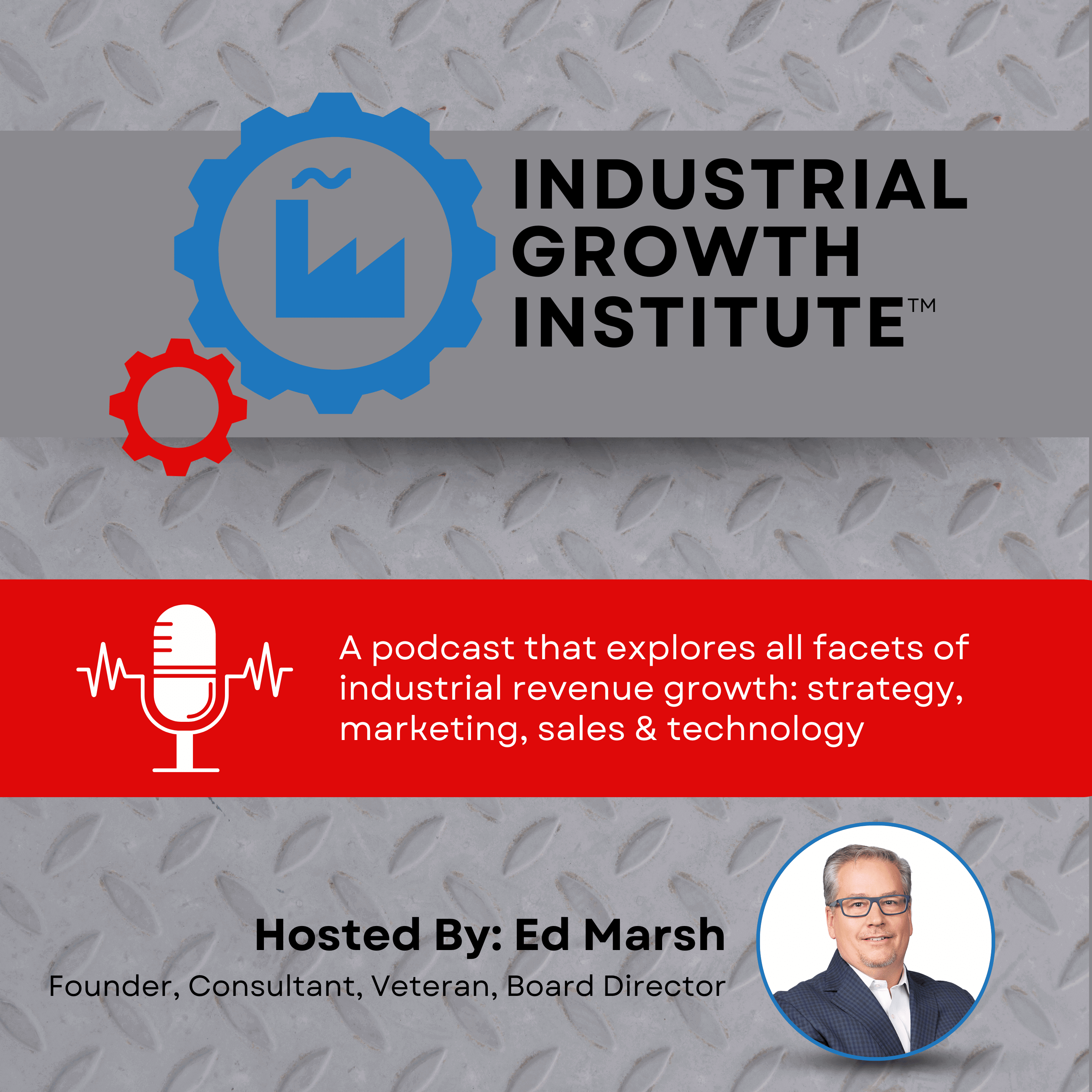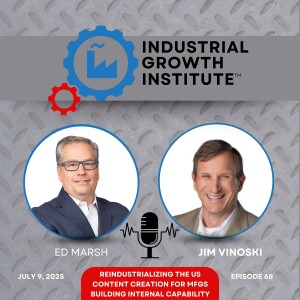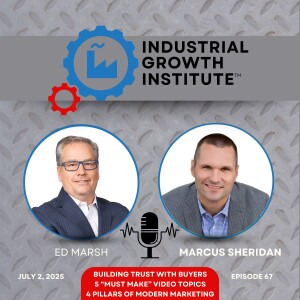Wednesday Aug 27, 2025
Busting Myths and Dropping Truths About B2B Industrial Sales with Derek Baer
Industrial Growth Institute

Ed Marsh is a founder, Army veteran, independent board director, manufacturing marketing expert, and industrial sales leader. He has marketed and sold millions of $ of B2B industrial manufacturing stuff worldwide. Each week on the Industrial Growth Institute, he chats with makers and thinkers, experts and specialists to gather innovative insights, recent trends, and tried & true best practices for B2B business growth. Each episode provides both actionable tips and theory, for everyone from owners and executive management through managers & directors to individual contributors - all in an enjoyable and energetic conversation format.
Episodes
Episodes



Wednesday Aug 20, 2025
Wednesday Aug 20, 2025
If you haven't asked yourself how to build a B2B website in the new post AI world, you're site is probably underperforming.
Not only has technology advanced, but buyer expectations for features, UX, navigation, and utility have changed. More importantly, the goal of your site has changed as buyer behaviors and search have changed. Today a site works mostly at the bottom of the funnel - the decision stage.
So your top of the funnel marketing must be accomplished using different tools and approaches.
Joe Jerome brings years of design and development experience, and a keen sense of what your industrial marketing website needs to accomplish.
Chapters
00:00 Introduction to Website Strategy for B2B
05:54 Aligning Website Goals with Business Objectives
12:27 The Impact of AI on Website Design
25:50 Continuous Website Evolution vs. Episodic Projects
32:42 Balancing Aesthetics and Functionality in Design
39:38 SEO and Migration Management
44:54 The Role of Websites in the Sales Process
46:29 Understanding User Behavior on Websites
57:49 The Evolution of Website Forms
01:02:37 Empowering Marketing Teams with Website Control
01:05:51 When to Redo Your Website
Resources
Check out Joe's Brand Builder Solutions website.
LinkedIn: Joe Jerome and Ed Marsh
Twitter: Ed Marsh
Instagram: Ed Marsh
YouTube: @JoeJerome and @EdMarsh
Show Transcript
The Website is NOT the Only Thing That Has to Change!
AI, Google Search, SEO, buying teams, buying journeys - it's all changing. Quickly. Yes, listen to Joe's tips on how to update your website, but beyond that, there's work to do on the rest of your manufacturing marketing, your industrial sales, and more. That's what I discuss in this guide.
Read more from Ed's recent paper on these critical changes.



Wednesday Aug 13, 2025
Wednesday Aug 13, 2025
If you're a machinery OEM you probably would like to ignore used machines. They're a hassle. For customers who own them, you have to provide support as components become obsolete and tribal knowledge dwindles.
When you compete against yourself, that's particularly frustrating, especially when it seems like buyers are just trying to save a few bucks and don't care about the hard work of R&D and improvement that you've invested in.
But buyers may see it differently, and Matt Smith draws on years of deep insight in global used machinery markets to explain why it's an entirely rational (not cheap) decision for some buyers in some situations, and why OEMs may cost themselves years of profitable new machinery and after-market sales by ignoring used machines.
Stop ignoring and scoffing at used machines, and consider incorporating them into your overall offering using some of Matt's recommendations.
Chapters
00:00 Introduction to the Challenge of Self-Competition 04:03 Understanding Global Asset Optimization 10:17 The Dynamics of the Used Machinery Market 19:23 Leveraging Lead Time and Flexibility 24:08 The Role of OEMs in the Used Machinery Market 31:48 Navigating Capital Investment Decisions 40:09 The Importance of Risk Management in Equipment Purchases 46:05 Conclusion and Key Takeaways
Resources
Check out Matt's website and other recommended used machinery resources:
AOTCO Surface Finishing
Asset Industry Resources Mentioned in the Episode:
Investment Recovery Association
EquipNet
BidSpotter
LabX
Surplus Solutions
Surplus Sherpa
LinkedIn: Matt Smith and Ed Marsh
Twitter: Ed Marsh
Instagram: Ed Marsh
YouTube: @EdMarsh
Show Transcript
Rethinking Our Market Attitudes and Assumptions
Recognizing the potential of used machines as a business benefit rather than a threat is just one example of how we should adjust our market assumptions.
Buyer habits and expectations are changing, just as AI is shifting how buyers search and consider complex decisions.
Read more from Ed's recent paper on these critical changes.



Wednesday Aug 06, 2025
Wednesday Aug 06, 2025
If you're not embracing PR as a key pillar of your industrial marketing strategy, you're probably not going to survive the collapse of traditional SEO driven content marketing!
AI is disrupting everything about how buyers think, research, learn, evaluate and buy. It's overwhelming and we can only guess about where we'll be in five years. In the meantime, we have to position ourselves to thrive amidst the trends and changes we see. That means that we must become known and trusted - and SEO experts like Rand Fishkin and Marcus Sheridan suggest that the playbook of Public Relations is an important element of that. But you have to do it right.....
So this week, Greg Matusky, founder of one of the 40 largest PR firms in America, joins me to talk about AI, marketing, disruption, and the reshaped role of PR as an element of manufacturing marketing.
If you're ready to go from worrying about traffic to making an industrial marketing impact, hit play and learn from Greg.
Chapters
02:12 Understanding the Role of PR
06:04 The Evolving Landscape of PR and Manufacturing Marketing
23:31 Building Relationships Through Video
30:36 Navigating PR Strategies
33:15 The Future of SEO, PR, and Industrial Manufacturing Revenue Growth
54:09 The Future of AI and PR
01:07:08 Managing Long-Term PR Trends
01:10:20 The Board's Role in PR
01:13:34 The Critical Role of PR in Industrial Marketing
Resources
Check out Greg's website and podcast: Gregory FCA and The Disruption is Now
LinkedIn: Greg Matusky and Ed Marsh
Twitter: Greg Matusky and Ed Marsh
Instagram: Ed Marsh
YouTube: @GregoryFCA and @EdMarsh
Show Transcript
You're Marketing and Selling to YESTERDAY'S Buyers!
Buyers' behaviors are shifting quickly. Industrial sales and manufacturing marketing teams must adapt radically and quickly. Traditional approaches are failing. We need to change, but first we need to understand how buyers are changing, how their behaviors are evolving, and what that means to us.
Read more from Ed's recent paper on these critical changes.



Wednesday Jul 30, 2025
The Five Buying Decisions Key to Industrial Sales Success
Wednesday Jul 30, 2025
Wednesday Jul 30, 2025
A simplistic sales process sets your team up to fail. Most industrial sales teams never even know who makes the real buying decision!
Want to forecast accurately? You must understand how these five buying decisions shape the buying journey, and your sales process must address them!
Host Ed Marsh lays out his theory of five buying decisions in this solo Episode #71 of the Industrial Growth Institute Podcast
Summary
In this episode, Ed Marsh discusses the complexities of B2B industrial sales, emphasizing the importance of understanding the buying process and the critical decisions that influence sales outcomes. He illustrates that in most complex B2B buying decisions, the real decision is made without the reps, or even many influencers, even knowing.
The five buying decisions include:
to commit some resources to evaluating the potential improvement of a change
to request capital
to approve capital
how to select a vendor
vendor selection
And most complex sales teams and manufacturing marketing departments focus on decision number five - vendor selection - with endless talk about what they make and do.
He highlights the challenges faced by sales reps, the need for business acumen, and the significance of engaging with decision-makers early in the sales process.
The conversation outlines five key buying decisions that impact sales success and offers strategies for improving sales effectiveness in a competitive landscape.
Takeaways
Most complex industrial purchases must pass through hurdles of five buying decisions
Decisions 2 & 3 determine whether there is even a purchase, and most reps don't know about it.
Most big-ticket complex B2B industrial sales forecasts are fantasies.
Sales reps often don't understand how business buying decisions are made.
Buying teams typically consist of eight to twelve people.
Sales reps need to bring business acumen to conversations.
Most buyers prefer a sales rep-free experience.
The first vendor contacted often wins the order.
Sales efforts focus too much on vendor selection.
Understanding the five buying decisions is crucial for sales success.
Sales reps must engage with decision-makers early in the process.
Creating projects rather than just finding them is essential for success.
Takeaway Quote from Ed Marsh
"In many cases, the board is going to sign off."
Learn more about the five buying decisions here.
LinkedIn: Ed Marsh
Twitter: Ed Marsh
Instagram: Ed Marsh
YouTube: @EdMarsh
Show Transcript
Chapters
00:00 Understanding the Flaws in B2B Sales Forecasting 02:46 The Complexity of B2B Sales 05:38 The Five Critical Buying Decisions 08:00 The Role of Sales Reps in Complex Sales 11:19 Navigating Capital Approval Processes 14:10 The Importance of Business Acumen in Sales 17:15 Creating Projects vs. Finding Opportunities 20:05 Conclusion and Call to Action



Wednesday Jul 23, 2025
Selling a Family Owned Manufacturing Business - Michael Horn Jr.
Wednesday Jul 23, 2025
Wednesday Jul 23, 2025
Selling a business after a great run. Finding the right buyer, making the right decision, doing the deal right - Episode 70 of the Industrial Growth Institute Podcast with Michael Horn, Jr.
Summary
This week, Michael Horn, Jr., former CEO of AC Horn, a fourth-generation family-owned food processing machinery builder, is in the studio chatting about the journey to a business sale. After military service and a stint as a ski instructor, he joined the struggling family business in 2011 and became CEO unexpectedly in 2014 when his father died in a bicycle accident.
Michael shares details of the transformation he helped lead, turning a company weakened by the GFC into an automated, precision, contemporary manufacturer, and shifting from fabrication and component sales to systems. Fun fact - 80 to 90 % of nut butters made in North America ran through at least one AC Horn machine.
Michael speaks in detail about changes in buyer behaviors, the growth of buying teams, the impact of COVID-19 & PPP funds on capital equipment spending cycles, and succession planning. He offers tips for companies considering an exit, including:
Hire professional M&A advisors
Work outside the family business first to gain perspective and leadership experience
Maintain clean financial records and establish proper organizational structure with defined processes
The bottom line from Michael's perspective is simple - "Treat the business as an asset, not an heirloom." This enables you to make informed business decisions, including an exit if and when that becomes appropriate. In Michael's case, he watched another family successfully exit, and he planned to strategically emulate them. In early 2024, AC Horn was acquired by Probat.
Takeaways
Experience in the military teaches important business skills and perspectives
Succession planning is critical
Work outside the family business is an important preparatory step
Generational refresh can be important. Michael Sr. diversified from metal fab into machinery and Michael Jr. modernized the shop and business approach
Independent advisors and/or directors can guide a company through strategic transitions and exits
Bigger transactions (system sales) may be beneficial to both seller and buyer
International markets and competition have changed significantly in the past 15 years
Consolidation of domestic suppliers, often through earlier exits, has changed the landscape for manufacturers
COVID and PPP money may have distorted capital equipment investment cycles
Proper financial reporting is necessary to prepare for any transaction
Managing the business and diligence is taxing
Professional M&A advisory is critical to navigate the exit journey and achieve an appropriate outcome
Takeaway Quotes from Michael Horn
"Think about your business like it's an asset, not an heirloom."
"Assets have value. Values go up and down."
"You may think that you know your business, but you'll have no idea how to sell it."
Learn more about the Horn family legacy and machines: AC Horn
LinkedIn: Michael Horn, Jr. and Ed Marsh
Twitter: Ed Marsh
Instagram: Ed Marsh
YouTube: @EdMarsh
Show Transcript
Chapters
00:00 The Importance of Legacy in Family Businesses 02:16 Michael Horn's Journey in the Family Business 06:33 Transitioning Leadership: A Personal Story 17:11 Navigating Crisis and Succession Planning 23:52 Adapting to Market Changes and Buyer Behavior 30:20 Building Strong Supplier Relationships 40:47 The Art of Relationship Building in Sales 43:05 Market Dynamics and Sales Strategies Post-COVID 46:19 Advice for Machinery Companies Facing Slowdowns 50:06 The Journey of Selling a Family Business 53:48 The Importance of M&A Advisors 57:39 Post-Sale Reflections and Employee Communication 59:30 Preparing for Future Business Transactions 01:02:34 Advice for G3 and G4 in Family Businesses 01:06:08 Resources for Family-Owned Businesses 01:09:30 Final Thoughts on Liquidity Events
You're Marketing and Selling to YESTERDAY'S Buyers!
Buyers' behaviors are shifting quickly. Industrial sales and manufacturing marketing teams must adapt radically and quickly. Traditional approaches are failing. We need to change, but first we need to understand how buyers are changing, how their behaviors are evolving, and what that means to us.
Read more from Ed's recent paper on these critical changes.



Wednesday Jul 16, 2025
Wednesday Jul 16, 2025
Rewriting the Rules of Enterprise Software for Manufacturing - Episode 69 of the Industrial Growth Institute Podcast with Radu Spineanu
Summary
Radu Spineanu is in the studio with Ed Marsh this week to discuss the intersection of AI and manufacturing, and explore how AI is poised to completely change enterprise software.
Radu shares his journey as a founder, through an IPO, his time in YCombinator, and in founding HumbleOps, a company focused on leveraging AI to improve manufacturing processes. They delve into the challenges of selling to manufacturers, the importance of understanding buyer behavior, and the future of manufacturing in an AI-driven world.
Radu emphasizes the need for manufacturers to adapt to these changes or risk being left behind, and explores the challenges he's found in selling to manufacturers vs. tech companies.
Takeaways
Disruption in manufacturing requires a shift in sales strategies
AI is transforming how manufacturing operates and sells.
HumbleOps aims to digitize manufacturing processes effectively.
Manufacturers often face challenges in adopting new technologies.
Sales in manufacturing is more complex than in tech industries.
Understanding buyer behavior is crucial for successful sales.
AI can automate and optimize manufacturing operations.
The future of manufacturing will involve less human labor but higher efficiency.
Companies must adapt to AI or risk obsolescence.
The journey of founding a startup involves continuous learning and adaptation.
Takeaway Quotes from Radu Spineanu
"AI will run your factory."
"The future is coming."
"You have to understand AI."
Check out Radu's websites: HumbleOps.ai
LinkedIn: Radu Spineanu and Ed Marsh
Twitter: Radu Spineanu and Ed Marsh
Instagram: Radu Spineanu and Ed Marsh
YouTube: @RaduSpineanu and @EdMarsh
Show Transcript
Chapters
00:00 Introduction to Disruption in Manufacturing 02:20 The Evolution of AI and Its Impact 14:11 Founding HumbleOps: A Journey in Manufacturing 22:12 HumbleOps: Revolutionizing Manufacturing with AI 33:24 Real-World Applications of HumbleOps 42:41 The Future of Custom Software in Manufacturing 43:41 The Rapid Evolution of AI 46:30 Imagining the Future of Manufacturing 48:59 The Impact of AI on Business Adaptation 52:45 Cultural Insights: From Romania to Silicon Valley 55:16 Entrepreneurship and Failure: A Cross-Cultural Perspective 59:12 Reflections on Romania's Transition from Communism 01:02:54 The Journey of a Tech Investor 01:08:32 Sales Strategies in Manufacturing 01:15:38 Navigating the Complexities of Manufacturing Sales 01:22:32 AI's Transformative Role in Manufacturing
You're Marketing and Selling to YESTERDAY'S Buyers!
Buyers' behaviors are shifting quickly. Industrial sales and manufacturing marketing teams must adapt radically and quickly. Traditional approaches are failing. We need to change, but first we need to understand how buyers are changing, how their behaviors are evolving, and what that means to us.
Read more from Ed's recent paper on these critical changes.
#Manufacturing #AI #AISoftware #ManufacturingSoftware #EnterpriseSoftware #Disruption #Sales #Technology #HumbleOps #RaduSpineanu #DigitalTransformation #IndustrialGrowth #Innovation



Wednesday Jul 09, 2025
Episode 68 - Jim Vinoski on American Re-Industrialization and Marketing Content
Wednesday Jul 09, 2025
Wednesday Jul 09, 2025
Sales for Manufacturers, and creating content that resonates with people who actually bend steel and make stuff - Episode 68 of the Industrial Growth Institute Podcast with Jim Vinoski, Forbes contributor and the voice of Manufacturing Talks
Summary
Manufacturing podcast veteran Jim Vinoski joins Ed Marsh in the studio this week to discuss manufacturing, policy, content creation, veterans, scouts, bicycling, and more!
They discuss the importance of skilled trades education, the challenges of content creation in the manufacturing sector, and the need for a resurgence in American manufacturing. Jim shares his journey from factory floors to writing for Forbes and launching his own content consultancy.
The conversation emphasizes the significance of understanding the audience, the role of policy in manufacturing, and the value of quality content in driving industry growth.
Takeaways
Jim Vinoski emphasizes the importance of promoting manufacturing among youth.
The partnership between Mike Rowe and Pure Talk aims to support veterans in skilled trades education.
Manufacturing is a challenging yet rewarding field that requires constant innovation.
Content creation should focus on solving problems for the audience, not just promoting products.
The resurgence of manufacturing in the U.S. is a national trend, not limited to specific regions.
Scouting plays a vital role in developing skills and values in youth.
Understanding the audience is crucial for effective content marketing in manufacturing.
AI can help bridge the gap in content creation for manufacturers.
Manufacturers need to take responsibility for their own content and messaging.
Quality content creation requires time, effort, and expertise.
Takeaway Quotes from Jim Vinoski
"It's an honor to partner with Mike Rowe"
"We need to bring back manufacturing jobs."
"Quality content creation takes work."
Check out Jim's various websites:
Cosgrove Content
Manufacturing Talks
Jim's Forbes byline
Jim's Book on Amazon
LinkedIn: Jim Vinoski and Ed Marsh
Twitter: Jim Vinoski and Ed Marsh
Instagram: Jim Vinoski and Ed Marsh
YouTube: @ManufacturingTalks and @EdMarsh
Ed's Website: Ed Marsh Consulting
Show Transcript
Chapters
00:00 Introduction to Manufacturing Advocacy 02:03 Veterans and Skilled Trades Education 05:40 Jim Vinoski's Manufacturing Experience 07:56 Writing for Forbes and Content Creation 11:58 Launching Cosgrove Content and Manufacturing Talks15:14 Understanding the Audience in Content Creation 19:14 Re-Industrializing America 21:11 The Role of Scouting in Youth Development 30:07 History Buff and Its Influence 31:15 Navigating Policy and Regulation in Manufacturing 41:09 The National Resurgence of Manufacturing 42:12 Workflow and Consistency in Content Creation 43:23 Cycling as Stress Relief 50:57 The Importance of Quality Content 53:56 Recruitment Challenges in Manufacturing 55:53 Funding for MEPs and Industry Responsibility 01:00:22 The Need for Partnerships in Manufacturing 01:01:43 Upcoming Book and Its Themes 01:05:22 Recommended Podcasts and Resources 01:08:58 Final Thoughts on Content Creation
You're Marketing and Selling to YESTERDAY'S Buyers!
Buyers' behaviors are shifting quickly. Industrial sales and manufacturing marketing teams must adapt radically and quickly. Traditional approaches are failing. We need to change, but first we need to understand how buyers are changing, how their behaviors are evolving, and what that means to us.
Read more from Ed's recent paper on these critical changes.
#SalesForManufacturers #ManufacturingSales #ManufacturingTalks #JimVinoski #TipsForSellingToManufacturers #HowManufacturersCanSellMore #Podcast #EdMarsh #Manufacturing #BusinessDevelopment #ManufacturingRevenueGrowth #B2BSalesAndMarketing #B2BSalesTechniques #B2BSales #TechnicalSales #IndustrialMarketing #ManufacturingMarketing #ContentMarketing #complexSales #BusinessGrowth #B2BSalesProcess #IndustrialSalesTraining #ContentCreation #skilledTrades #IndustrialGrowth



Wednesday Jul 02, 2025
Episode 67 - Marcus Sheridan on Endless Customers, Trust, Marketing, Sales & Video
Wednesday Jul 02, 2025
Wednesday Jul 02, 2025
Building a Known and Trusted Brand Through Effective Content Marketing in a Zero-Click World - Episode 67 of the Industrial Growth Institute Podcast with Marcus Sheridan, Author of "Endless Customers"
Summary
Ed Marsh and Marcus Sheridan explore the evolution of content marketing, the impact of AI on business, and the importance of transparency and trust in the industrial manufacturing space.
In this marketing podcast conversation, they discuss the 'Pride Cycle' and how businesses can navigate challenges by embracing change and innovation. Marcus shares insights from his books "They Ask You Answer" and "Endless Customers", including:
the need for companies to adopt a media mindset
the importance of video for marketing and sales
how AI is changing buyer behaviors
why "Our industry is different" is so dangerous
the compelling need to differentiate through your marketing and sales
The conversation highlights the significance of building a known and trusted brand in a rapidly changing market, navigating a Zero-Click world where buyers use LLMs for research, and the universal appeal of Marcus' simple approach, regardless of industry.
Takeaways
Content marketing has evolved significantly over the years.
The industrial manufacturing space often feels unique, but principles of marketing apply universally.
Four pillars of building a Known and Trusted Brand include: Say what others won't, Who what others won't, Sell in a way others don't, Be more human
AI is reshaping the business landscape for marketing and sales
The importance of executive sponsorship
The Pride Cycle illustrates the need for continuous effort in marketing and sales.
Transparency in pricing builds trust and differentiates businesses.
Video marketing is crucial for modern engagement and brand building.
Big 5 video types include Cost & Price, Problems, Versus & Comparison, Reviews, and Best in Class
The buyer's journey has changed; companies must adapt to new consumer behaviors.
Why every company needs to think of themselves as a media company.
Building trust is essential in a market with a significant trust deficit.
Corporate speak works reduces credibility
How Salt Water Fishing University is an outlet but also a deliberate learning experience for Marcus
Sales and marketing must work closely together to succeed.
Embracing the grind and treating marketing as a priority is vital for long-term success.
Sales must use video as well
The importance of sales process, coaching and role playing
Takeaway Quotes from Marcus Sheridan
"You're not special."
"Opportunity gets really high when resistance gets really high."
"Most companies are practicing on their customers."
Check out Marcus' various websites:
MarcusSheridan.com
Amazon Endless Customers
Endless Customers Website
PriceGuide.ai
Question First Group
LinkedIn: Marcus Sheridan and Ed Marsh
Twitter: Marcus Sheridan and Ed Marsh
Instagram: Marcus Sheridan and Ed Marsh
YouTube: @MarcusSheridan and @SaltWaterFishingUniversity and @EdMarsh
Show Transcript
Chapters
00:00 The Evolution of Content Marketing 10:23 Understanding the Pride Cycle 18:07 The Ask, You Answer Methodology 32:02 Adapting to AI and Trust Signals 42:16 Transforming Websites into Conversion Tools 44:37 The Rise of YouTube as a Marketing Hub 48:25 Interactive Tools and Self-Service in Marketing 50:41 Building Trust in a Trust-Deficient Market 52:54 The Four Pillars of Endless Customers 56:08 The Importance of Marketing Investment 01:00:36 Embracing the Grind in Business 01:15:03 Building a Known and Trusted Brand
You're Marketing and Selling to YESTERDAY'S Buyers!
Buyers' behaviors are shifting quickly. Industrial sales and manufacturing marketing teams must adapt radically and quickly. Traditional approaches are failing. We need to change, but first we need to understand how buyers are changing, how their behaviors are evolving, and what that means to us.
Read more from Ed's recent paper on these critical changes.
#MarketingPodcast #ContentMarketing #AI #IndustrialManufacturing #B2BMarketing #ManufacturingMarketing #IndustrialMarketing #Trust #Brand #KnownAndTrustedBrand #VideoMarketing #SalesVideo #MarketingVideo #BuyersJourney #BuyingJourney #Transparency #Authenticity #EndlessCustomers #TheyAskYouAnswer #PrideCycle #SalesProcess

Building Together
The Industrial Growth Institute Podcast is for the makers in America. The folks who relentlessly drive innovation and manufacturing. Who create the small and middle-market companies that form the fabric of America's economy as the source of pride, jobs and community.
Creating the products is only half the battle. Keeping up with changing market and buyer expectations is critical too, because predictable, manageable, profitable growth is key to thriving manufacturing.
That's the goal of the Industrial Growth Institute Podcast. To bring experts, insights, and inspiring makers to you, in engaging informative interviews that range from theory to practical...in every episode. Real people. Real expertise. Real lessons. Real value.







